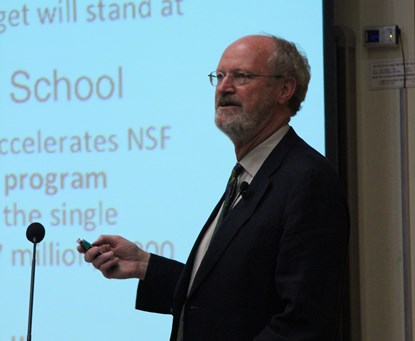On May 21, the 2005 Nobel Chemistry prizewinner Professor Robert H. Grubbs from the Department of Chemistry at California Institute of Technology, gave a special seminar abpout green chemistry and catalysis at Terman Hall of the Creative Learning Building (E11). The special seminar introduced green approaches in catalytic research on chemical processes and future challenges in olefin metathesis.
Professor Grubbs is renowned for his work in developing catalysts that induce a chemical reaction called olefin metathesis. Olefin metathesis is an organic chemical reaction which can redistribute double bonds between carbon atoms, which are hard to break and bond together in conventional reactions. With the selective catalysts that can cut and regenerate these double bonds in one simple step, olefin metathesis reduces the number of required reactions in organic products. This highly efficient process now creates fewer hazardous chemical wastes and is hailed as a big step in green chemistry.

The seminar first introduced his early life as a young undergraduate who experienced the heydays of American science. He mentioned that the American sciences were aptly funded during the 1960’s when emphasis on international scientific and technological competition further accelerated the growth of the National Science Foundation budget. He emphasized that he was at the right time and place to receive the benefits in the field of science.
Professor Grubbs also introduced how he started his renowned research in olefin metathesis catalysts. “In 1968, when I was a postdoctoral for Jim Coleman, he came back from a consulting trip and told us about this crazy reaction called olefin metathesis, which was found by accident.” He told the audience how puzzling this phenomenon was to him, “It was a very unusual reaction. You could put propylene in a flask and set it there for a hundred years, and nothing will happen. You put a catalyst, it will happen in seconds.”
The later portion of the seminar introduced the current state of development in olefin catalysis and the future challenges ahead. “I think the key to the future is [to] change our chemical processes.” Professor Grubbs expanded the changing scope in olefin metathesis by introducing companies and research groups that develop chemical compounds, such as sustainable natural oils, artificial pheromones for disrupting agricultural pests, and novel polymers for photonic crystals.

